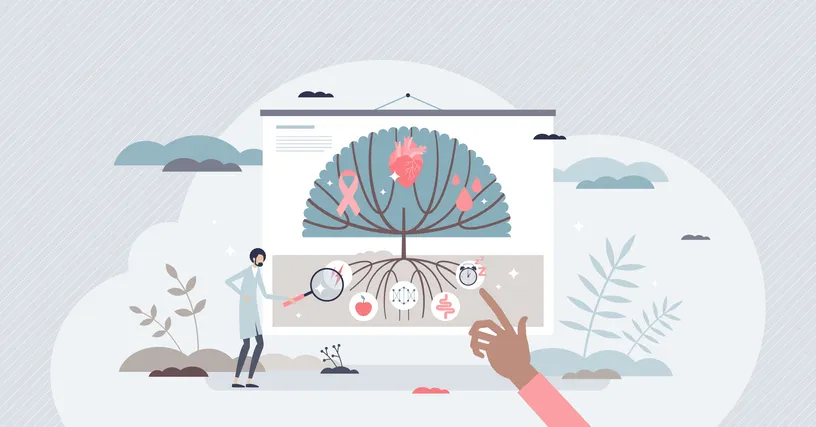
Diseases of Modern Civilization: Autoimmune and Nutritional
Unraveling The Modern Diseases: Autoimmune
In autoimmune disease a person’s own immune system turns on itself. Antibodies within our immune system are normally our defenses against injury (healing a cut) or intruders (viruses or bacteria) or chaos (growing cancers), but sometimes a body will make antibodies set out to attack the actual tissues of the body itself. We can identify autoimmune antibodies to tissues on simple blood tests
Do you know anyone with an autoimmune illness? I imagine you do: Hashimoto’s or Graves Diseases of the thyroid, lupus (SLE), rheumatoid arthritis, type 1 diabetes, and many diseases of the heart and cardiovascular system are autoimmune in origin. Our intestinal tract is another target of autoimmune: Crohn’s Disease and Ulcerative Colitis are well-known; lesser known is the entity of microscopic or lymphocytic colitis. It has even been questioned whether diverticulitis might have an autoimmune component.
The rate of autoimmune illness is increasing, at rather alarming rates: between 3% and 9% each year, ranging from
What is causing all this autoimmune illness?
It is thought that while you start with a genetic tendency or family history of autoimmune disease, we also expect that there has been some kind of injury, often associated with intestinal permeability (leaky gut) and finally some kind of significant stressor to develop autoimmune illness. The stressor could be physical, emotional or iatrogenic (prescribed by your doctor). An illness, an antibiotic to which you are allergic, or even a well-tolerated but strong drug, can all provoke a situation in which your immune system mounts an attack against your own body. Autoimmune disease is now the third leading cause of illness and death, following cardiovascular disease and cancer.
If you’ll follow the clues with me, you’ll see why we might have an increase in autoimmune disease in recent years, and how we can unravel those clues to find a way back to health for those with an autoimmune condition.
Genetic tendency. We are better at noticing, recording, and filling in the blanks when it comes to our family history, and we have changed how we think of a relative’s arthritis and another relative’s thyroid problems. Although there is a long and growing list of autoimmune diseases, or conditions that have an autoimmune component, they are all under the broader heading of “autoimmune”, just as both heart attacks and high blood pressure are part of cardiovascular disease, while breast and colon cancer are both in the cancer category. So your microscopic colitis might be related to that rheumatoid arthritis you know of in one of your family members
Injury with intestinal permeability. Fresh out of my medical training, I scoffed at the term “leaky gut” until I realized it was just non-doctor speak for what is abundantly referenced in the medical literature as “intestinal permeability. It should be clear why the contents of our intestinal tract need to be securely separated from the insides of our bodies, and our intestines have barriers called “tight junctions” to secure the gaps between the cells lining the intestine. Many events or exposures can cause those tight junctions to become leaky, and a healthy, unstressed person’s body will rise to the occasion and tighten the back up again. If the leak goes on for too long, our body summons the immune system to attack the intruders and sometimes parts of the body are casualties in the effort, increasing antibodies to our body’s own tissues: autoimmune disease from leaky gut.
Stress is often part of the “setting” for this perfect storm. I hardly need to cite a reference for this, but I will. I think we have fairly common acceptance of the fact that stress impairs our bodies’ ability to respond to health challenges, and that a weaker response opens the door for stress to result in diseases both autoimmune and other. Are we more stressed than our grandparents? A complete answer is the subject for another day, but at the simplest level: you have seen more strangers on any given day than your great grandmother saw in a month; for each “stranger” your innate wisdom wonders whether that person is friend or foe and responds accordingly. The modern world is stressful in a constantly changing way.
The good news is that understanding that there is a set of causes for autoimmune disease means that we have a chance to unravel the conditions of the disease and possibly lessen its intensity and–if we’re early in the picture and the conditions are favorable–even at times seem to completely reverse the disease.
Autoimmune disease is like any other health problem in that if someone has a complaint with or without a real diagnosis, I consider it my responsibility, as their physician, to help identify and reverse what could be the root cause. If they indeed have auto-immune disease, what are the factors that contributed to its cause? What are the factors that influence the severity of the disease? We can work together to look for answers and come up with a plan to sidestep the ravages of the condition
I am quite aware that not everything has a cause – as the saying goes, sometimes “shit happens.” Sometimes even the healthiest people end up with lousy diagnoses. Those that do the best with those lousy diagnoses are the ones who find a good team to work with: moral support, good medical expertise, and the resources needed to address their problem.
How do you approach your own medical problems? Do you have a good working relationship with a physician so you can team up to decide how deeply to look for causes? If autoimmune disease is one of your concerns, consider that you might be able to find a solution. Start by looking here for some answers, and let me know how it goes.

